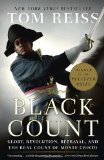Summary | Excerpt | Reviews | Readalikes | Genres & Themes | Author Bio

Critics' Opinion:
Readers' Opinion:
First Published:
Sep 2012, 432 pages
Paperback:
May 2013, 432 pages
The most notable event in Antoine's service at Philipsburg, however, was that he served as a witness to a duel that took place on the night of the Prince de Conti's birthday party at the front: it was between the Prince de Lixen and the Duke de Richelieu. The duke took offense when the prince mocked the Richelieu pedigree. The duke's grandfather had been Cardinal Richelieu (later immortalized as the mustache-twirling nemesis of the Three Musketeers), an adviser to Louis XIII who had managed royal financial and building projects to great advantage—both for himself and for France. But such accomplishments did not measure up to the high standards of snobbery practiced by Lixen, who regarded the Richelieu clan as parvenus. To make matters worse, the duke had recently offended the prince by marrying one of his cousins.
At midnight, the illustrious in-laws met in the field of honor between the dining tents and the trenches. They began lunging at one another there in the dark, their lackeys lighting the swordfight with flickering lanterns. The prince took the advantage first, wounding Richelieu in the thigh. The lackeys switched from lanterns to bare torches, and the combatants chased each other in and out of the trenches, their blades reflecting fire. The prince stabbed the duke in the shoulder. At this point an enemy barrage lit the field of honor. One of the lackeys was hit and killed.
Richelieu counterattacked, and with Antoine watching, the duke sank his blade into the chest of his unfortunate in-law. Contemporaries considered it a sort of poetic justice, since Lixen himself had recently dispatched one of his own relations, his wife's uncle, the Marquis de Ligneville, for a similarly trifling offense. Such were the friendly-fire deaths of the eighteenth-century battlefield.
In 1738, when the war ended, Antoine took the chance to get out of the army and Europe altogether. While he was stationed at Philipsburg, his younger brother Charles had joined a colonial regiment that went to the French sugar colony of Saint-Domingue, on the West Indian island of Hispaniola. This was a fortunate posting.
Sugar planting was the oil business of the eighteenth century, and Saint-Domingue was the Ancien Régime's Wild West frontier, where sons of impoverished noble families could strike it rich. Barely sixteen when he arrived in the colony as a soldier, by twenty-two Charles Davy de la Pailleterie had met and wooed a young woman, Marie-Anne Tuffé, whose family owned a sizable sugar plantation on the colony's wealthy northeast coast. Antoine decided to join him.
Today, the world is so awash in sugar—it is such a staple of the modern diet, associated with all that is cheap and unhealthy—that it's hard to believe things were once exactly the opposite. The West Indies were colonized in a world where sugar was seen as a scarce, luxurious, and profoundly health-giving substance.
Eighteenth-century doctors prescribed sugar pills for nearly everything: heart problems, headache, consumption, labor pains, insanity, old age, and blindness. Hence, the French expression "like an apothecary without sugar" meant someone in an utterly hopeless situation. Saint-Domingue was the world's biggest pharmaceutical factory, producing the Enlightenment wonder drug.
Columbus brought sugarcane to Hispaniola, the first European settlement in the New World, on his second voyage, in 1493. The Spanish and the Portuguese had been the first to cultivate sugar in Europe, and when they began their age of discovery, among the first places they "discovered" were islands off the coast of North Africa just perfect for sugar cultivation. As the Iberian explorers made their way down the African coast—the Portuguese going around the Horn to East Asia, the Spaniards cutting west to the Americas—both powers had two main goals in mind: finding precious metals and planting sugarcane. (Oh, and spreading the word of God.)
Excerpted from The Black Count by Tom Reiss. Copyright © 2012 by Tom Reiss. Excerpted by permission of Broadway Books, a division of Random House LLC. All rights reserved. No part of this excerpt may be reproduced or reprinted without permission in writing from the publisher.





The Funeral Cryer by Wenyan Lu
Debut novelist Wenyan Lu brings us this witty yet profound story about one woman's midlife reawakening in contemporary rural China.
Your guide toexceptional books
BookBrowse seeks out and recommends the best in contemporary fiction and nonfiction—books that not only engage and entertain but also deepen our understanding of ourselves and the world around us.